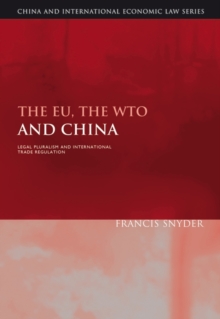
The EU, the WTO and China : Legal Pluralism and International Trade Regulation PDF
by Professor Francis Snyder
Part of the China and International Economic Law Series series
Description
This book presents a new theoretical framework for understanding the regulation of international trade.
For this purpose, it analyses a series of integrated studies of relations between the EU, the WTO and China.
It consists of three main parts. Part I introduces the basic concepts. It surveys the literature on law and globalisation, introduces the concept of sites of governance and the theory of global legal pluralism and sketches the foundations of global legal pluralism.
It shows that each site of governance has both a structural dimension, consisting of institutions, norms and dispute resolution processes, and a relational dimension, comprising its relations with other sites of governance.
The totality of sites of governance constitutes a new form of global legal pluralism.
Part II analyses global legal pluralism in action in relations between the EU, the WTO and China.
It examines the construction of relations between sites, ways in which relations between sites give rise to new legal concepts or transform the character of rules, the tension between regionalism and international integration and the governance of international production networks.
It emphasises the reciprocal interaction between the structural features and the relational features of sites.
Part III explores new directions in global legal pluralism.
It first analyses regional trade agreements as a way of creating new sites of governance, focusing on agreements involving China.
Then it considers how to enhance ethical values in international trade regulation.
Based on an institutional analysis of relations between the WTO and other sites of governance, it proposes ways in which global legal pluralism can be used to reform the WTO, today the predominant institution in the regulation of international trade, including trade between the EU and China.
Information
-
Download - Immediately Available
- Format:PDF
- Pages:533 pages
- Publisher:Bloomsbury Publishing PLC
- Publication Date:02/09/2010
- Category:
- ISBN:9781847315991
Other Formats
- Hardback from £160.00
Information
-
Download - Immediately Available
- Format:PDF
- Pages:533 pages
- Publisher:Bloomsbury Publishing PLC
- Publication Date:02/09/2010
- Category:
- ISBN:9781847315991










